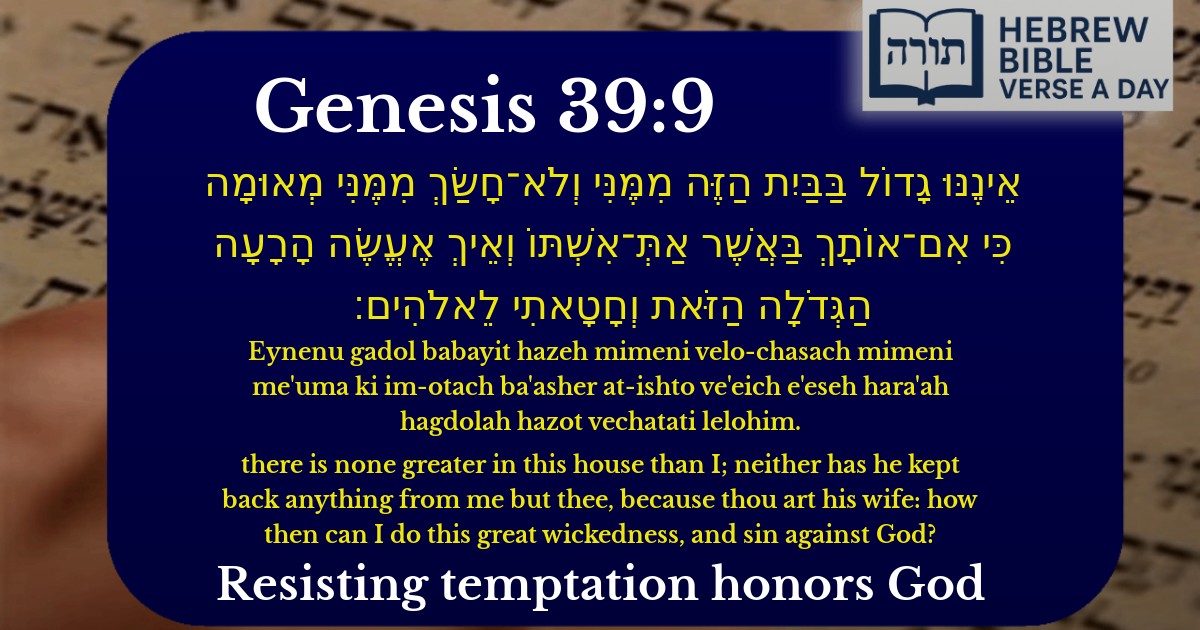Join Our Newsletter To Be Informed When New Videos Are Posted
Join the thousands of fellow Studends who rely on our videos to learn how to read the bible in Hebrew for free!
Hebrew Text
אֵינֶנּוּ גָדוֹל בַּבַּיִת הַזֶּה מִמֶּנִּי וְלֹא־חָשַׂךְ מִמֶּנִּי מְאוּמָה כִּי אִם־אוֹתָךְ בַּאֲשֶׁר אַתְּ־אִשְׁתּוֹ וְאֵיךְ אֶעֱשֶׂה הָרָעָה הַגְּדֹלָה הַזֹּאת וְחָטָאתִי לֵאלֹהִים׃
English Translation
there is none greater in this house than I; neither has he kept back anything from me but thee, because thou art his wife: how then can I do this great wickedness, and sin against God?
Transliteration
Eynenu gadol babayit hazeh mimeni velo-chasach mimeni me'uma ki im-otach ba'asher at-ishto ve'eich e'eseh hara'ah hagdolah hazot vechatati lelohim.
Hebrew Leining Text
אֵינֶ֨נּוּ גָד֜וֹל בַּבַּ֣יִת הַזֶּה֮ מִמֶּ֒נִּי֒ וְלֹֽא־חָשַׂ֤ךְ מִמֶּ֙נִּי֙ מְא֔וּמָה כִּ֥י אִם־אוֹתָ֖ךְ בַּאֲשֶׁ֣ר אַתְּ־אִשְׁתּ֑וֹ וְאֵ֨יךְ אֶֽעֱשֶׂ֜ה הָרָעָ֤ה הַגְּדֹלָה֙ הַזֹּ֔את וְחָטָ֖אתִי לֵֽאלֹהִֽים׃
אֵינֶ֨נּוּ גָד֜וֹל בַּבַּ֣יִת הַזֶּה֮ מִמֶּ֒נִּי֒ וְלֹֽא־חָשַׂ֤ךְ מִמֶּ֙נִּי֙ מְא֔וּמָה כִּ֥י אִם־אוֹתָ֖ךְ בַּאֲשֶׁ֣ר אַתְּ־אִשְׁתּ֑וֹ וְאֵ֨יךְ אֶֽעֱשֶׂ֜ה הָרָעָ֤ה הַגְּדֹלָה֙ הַזֹּ֔את וְחָטָ֖אתִי לֵֽאלֹהִֽים׃
🎵 Listen to leining
Parasha Commentary
📚 Talmud Citations
This verse is not quoted in the Talmud.


Context of the Verse
This verse (Bereishit 39:9) records Yosef's response to the wife of Potiphar, who attempted to seduce him. Yosef, recognizing the gravity of the situation, refuses her advances, emphasizing his loyalty to his master and his fear of sinning against Hashem.
Yosef's Moral Strength
Rashi explains that Yosef's declaration, "There is none greater in this house than I," highlights his elevated status in Potiphar's household. Despite this, he refuses to betray his master's trust. The Ramban adds that Yosef's refusal stems from his deep sense of gratitude and ethical integrity, recognizing that Potiphar had entrusted him with everything except his wife.
The Severity of the Sin
The phrase "how then can I do this great wickedness" underscores the gravity of the sin. The Midrash (Bereishit Rabbah 87:7) elaborates that Yosef saw the image of his father Yaakov at that moment, which strengthened his resolve to avoid transgression. This illustrates the concept of hirhur avi—contemplating the teachings and example of one's parents as a deterrent to sin.
Sin Against God
Yosef concludes by stating, "and sin against God." The Talmud (Sotah 36b) explains that Yosef recognized that all sins, especially those involving illicit relationships, are ultimately offenses against Hashem. This aligns with the principle of yirat Shamayim (fear of Heaven), which should guide a person's actions even in private moments.
Lessons from Yosef's Conduct